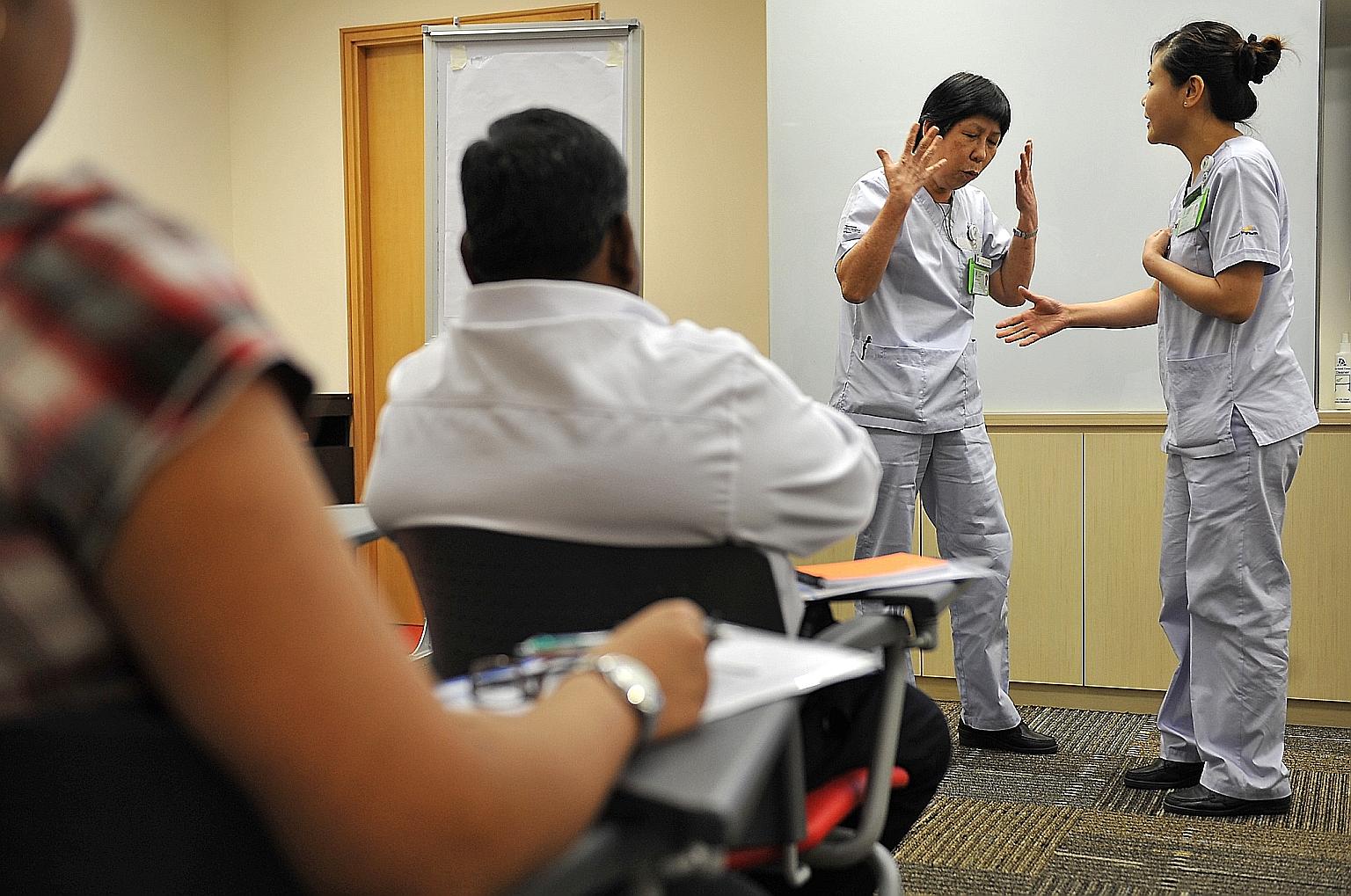Physical and verbal abuse against nurses 'on the rise'
Many such cases tend to happen at A&E and intensive care units, where emotions run high
Sign up now: Get ST's newsletters delivered to your inbox

A training session for front-line healthcare staff to handle difficult patients without hurting them. Nurses who spoke to The Sunday Times said roughly four in 10 patients are likely to raise their voices against healthcare staff.
ST FILE PHOTO
Follow topic:
When one of her patients began to throw a tantrum - shouting and banging her head against the walls - 31-year-old nurse Nur stepped in to try and calm her down.
But the hysterical woman kicked her in the chest, leaving her winded and shaken for the rest of the day.
Incidents like these are not uncommon, said Ms Nur, who declined to give her full name.
In her 14 years as a nurse, she has seen colleagues bitten, slapped and punched at work - both by patients and their family members. "This is something we didn't talk about at school, and it can be quite traumatising for young nurses," she said. "Even verbal abuse just spoils your day and lowers your morale, but you still have to carry on with the shift."
Worryingly, nurses who spoke to The Sunday Times said they felt such incidents of verbal and physical abuse are on the rise.
All of them said they had been on the receiving end of such abuse before, and that roughly four in 10 patients are likely to raise their voices against healthcare staff.
Last November, local medical journal Annals Academy of Medicine also published an editorial estimating that seven in 10 healthcare workers have faced physical abuse, and that there is generally "significant under-reporting" in this area.
Those at greater risk tend to be young and female, as well as front- line staff who come into contact with patients more frequently.
Accident and emergency departments (A&E), intensive care units, and other places where emotions run high tend to be where many abuse cases occur. "In the A&E, sometimes patients have to wait for two or three hours," said Madam Brenda Lee, 58, who has been a nurse for more than 40 years.
Those with fractures, for instance, may be in pain but are still considered Priority 2 - behind those with critical conditions such as heart attacks. And those with relatively minor injuries, such as sprains, headaches and animal bites, are considered Priority 3.
"Naturally there's a lot of frustration because they all want treatment immediately," Madam Lee said.
Mr Abdul Hadi Kamarolzaman, a former nurse who now teaches healthcare staff how to protect themselves in such tense situations, said simple techniques can help calm patients down. He himself was once attacked by a psychiatric patient wielding a drip stand.
"For many (patients), what they really want is for someone to listen to them," he said. "Show them that you are able to empathise, and allow them to ventilate."
However, he also teaches his students how to handle situations that threaten to become violent - for example, breaking free of grabbing hands or chokeholds without hurting the patient. He, too, has been hearing that the number of abuse cases has been going up, although he is not sure why. However, he stressed the important role that hospital managements play in preparing their staff for this part of their work.
"The management needs to be aware that this is an important part of nurse training," he said. "If you get it right, you can preserve morale and prevent attrition."
Ms Sue W, 29, who has been working as a nurse for five years, added: "Verbal abuse cases are rarely escalated to the police because of pressure from the management." She typically keeps her eyes peeled for tell-tale signs of aggression and calls for backup or tries to de-escalate the situation before anything happens.
Veteran unionist K. Thanaletchimi, who has been president of the Healthcare Services Employees' Union for 20 years, said hospitals should encourage their staff to report such incidents. At the very least, patients can be made to realise they could have handled the situation better. "It's about the 'heartware' - whether other people feel they should treat other human beings with basic dignity and respect," she said.

